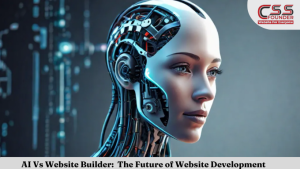In the rapidly advancing world of technology, artificial intelligence (AI) has emerged as a disruptive force, transforming numerous industries and sparking debates about its potential impact. One area where AI’s influence is particularly intriguing is the realm of website building. As AI capabilities continue to expand, many are questioning whether this cutting-edge technology will eventually render traditional website builders obsolete. To better understand this complex issue, let’s delve into the current landscape and explore the strengths and limitations of both AI and website builders and who will dominate the future of website development.

The Rise of AI in Web Development
AI has already made significant strides in web development, revolutionizing various aspects of the process. Machine learning algorithms have proven invaluable in analyzing vast amounts of data, identifying patterns, and providing insights that can enhance user experiences. These algorithms can learn from user behavior, preferences, and interactions, enabling the creation of more personalized and intuitive websites.
Furthermore, AI-powered tools have streamlined development workflows by automating repetitive tasks, such as testing and code generation. This automation not only reduces the workload on human developers but also minimizes the potential for human error, resulting in more efficient and reliable development processes.
However, it’s crucial to recognize that AI, despite its remarkable capabilities, is not a panacea. While it excels at specific tasks, it still lacks the creativity, intuition, and high-level decision-making abilities that human developers possess. Website builders, on the other hand, were designed to cater to a different need – providing a user-friendly platform for individuals and businesses to create visually appealing and functional websites without extensive coding knowledge.
The Enduring Strengths of Website Builders
Website builders have gained immense popularity due to their accessibility and ease of use. Platforms like Wix, Squarespace, and Weebly offer drag-and-drop interfaces, pre-designed templates, and a wide range of customization options. These tools have democratized website creation, empowering users with varying levels of technical expertise to create professional-looking websites without the need for extensive coding knowledge.
One of the key advantages of website builders is their ability to simplify the website creation process. Users can focus on the visual aspects and content, while the platform handles the underlying technical aspects, such as hosting, security, and responsive design. This approach lowers the barrier to entry, making it easier for small businesses and individuals to establish an online presence without significant investment in technical resources.
Additionally, many website builders offer integrated e-commerce solutions, allowing businesses to seamlessly set up online stores and sell their products or services. This integration eliminates the need for complex third-party integrations, further simplifying the process for non-technical users.
The Potential Symbiosis of AI and Website Builders
While AI may not entirely replace website builders in the near future, the integration of AI capabilities into these platforms could enhance the user experience and functionality in numerous ways. For instance, AI-powered design assistants could analyze a user’s preferences, business goals, and industry trends, and automatically generate visually appealing and optimized website layouts.
Furthermore, AI could be leveraged to improve website performance and search engine optimization (SEO). By analyzing user behavior data and search patterns, AI algorithms could suggest content optimization strategies, ensuring that websites are more discoverable and engaging for visitors.
Moreover, AI-driven chatbots and virtual assistants could be integrated into websites, providing 24/7 customer support and improving the overall user experience. These AI-powered tools could answer frequently asked questions, guide users through the website, and even assist with simple tasks like scheduling appointments or processing orders.
The Future of Website Building: A Collaborative Approach
As AI continues to advance, it’s unlikely that it will completely replace website builders. Instead, a more plausible scenario is one where AI and website builders coexist and complement each other, leveraging their respective strengths to create a more seamless and efficient website building experience.
Website builders will likely adapt and incorporate more AI capabilities to remain competitive and meet the evolving needs of users. Failure to do so could result in these platforms becoming obsolete or overshadowed by more advanced AI-driven solutions. However, by embracing AI, website builders can offer users the best of both worlds – the ease of use and accessibility of traditional website builders, combined with the power and intelligence of AI-driven tools.
Ultimately, the future of website building will involve a seamless integration of human creativity and AI capabilities. While AI may automate certain tasks and enhance the overall process, human developers and designers will still play a crucial role in crafting unique and engaging digital experiences tailored to specific business requirements and user preferences.
Conclusion
In the ongoing debate surrounding AI’s potential to replace website builders, it’s evident that a complete replacement is unlikely in the near future. Instead, the two technologies are poised to coexist and complement each other, creating more efficient, personalized, and user-friendly solutions for building websites.
The true power lies in striking the right balance between leveraging AI’s capabilities and harnessing human creativity and expertise. By combining the strengths of AI and website builders, businesses and individuals can benefit from streamlined processes, enhanced user experiences, and the ability to create truly unique and captivating online presences.
As the tech landscape continues to evolve, it will be fascinating to witness the innovative ways in which AI and website builders collaborate, pushing the boundaries of what’s possible in the realm of website creation and online experiences.








